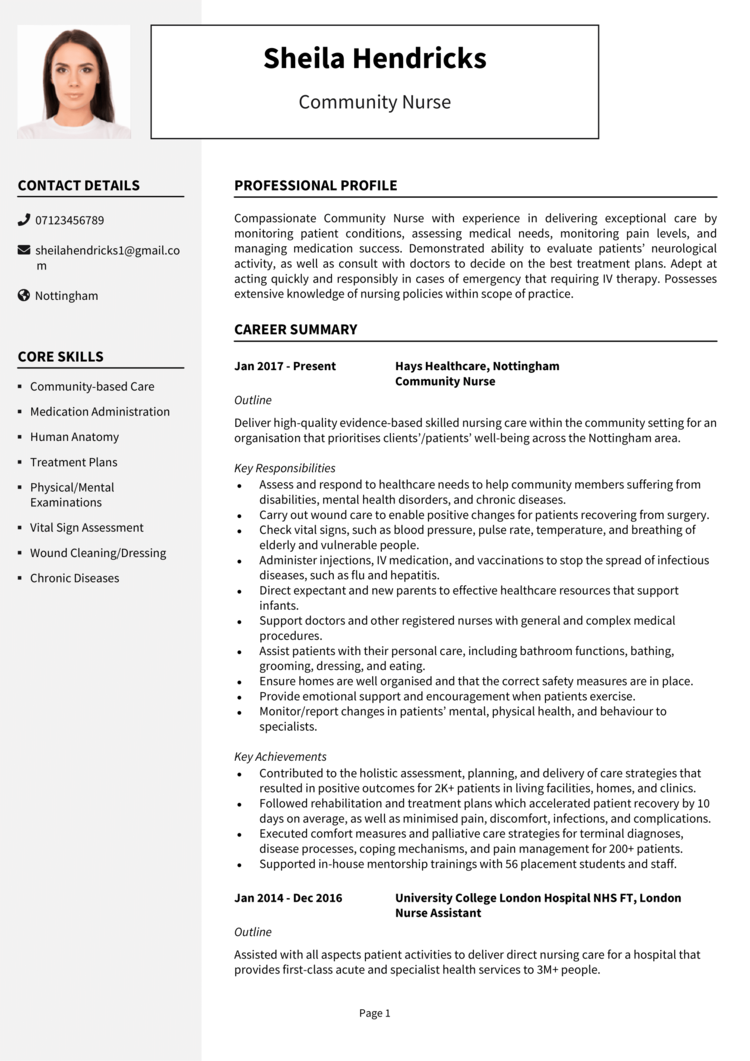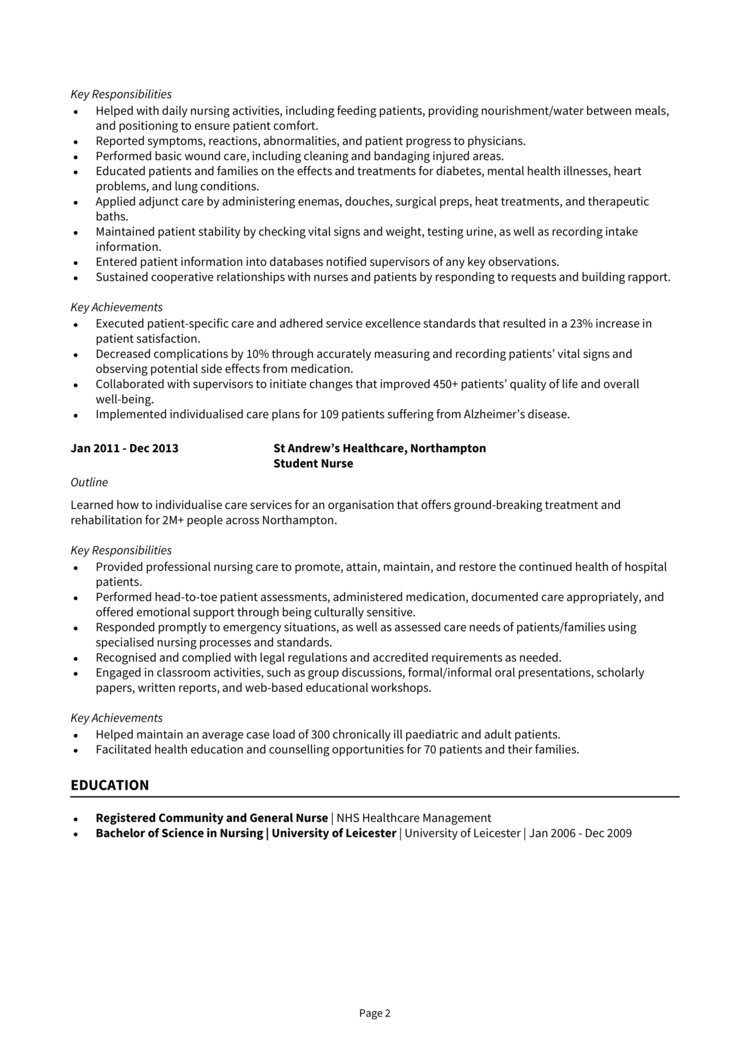Being a community nurse is a rewarding, enriching profession, and you’ll be the first point of contact for many passing through the healthcare system.
As a community nurse, ethics, empathy, listening skills, and patience are all non negotiable skills that employers are looking for – but how do you convey these skills on your CV?
Have a look at our community nurse CV example just below for inspiration, guidance, and advice on structuring a successful CV.
|
Community Nurse CV example
This is a good example of a Community Nurse CV which is professionally formatted, and structured in a way that allows recruiters to easily find and understand the candidate’s key selling points.
Take some time to look at this CV and refer to it throughout the writing of your own CV for best results.


Community Nurse CV structure & formatting
The format and structure of your CV is important because it will determine how easy it is for recruiters and employers to read your CV.
If they can find the information they need quickly, they’ll be happy; but if they struggle, your application could be overlooked.
A simple and logical structure will always create a better reading experience than a complex structure, and with a few simple formatting tricks, you’ll be good to go.
How to format your CV
- Length: Two sides of A4 makes for the perfect CV length, though one page is okay for less experienced applicants. This forces you to make sure that every single sentence adds value to your CV and ensures you avoid waffle.
- Readability: By clearly formatting your section headings (bold, or a different colour font, do the trick) and breaking up big chunks of text into snappy bullet points, time-strapped recruiters will be able to skim through your CV with ease.
- CV design: Your CV needs to look professional, sleek and easy to read. A subtle colour palette, clear font and simple design are generally best for this, as fancy designs are often harder to navigate.
- Photographs: Profile photos or aren’t a requirement for most industries, so you don’t need to add one in the UK – but if you do, just make sure it looks professional
Quick tip: Creating a professional CV style can be difficult and time-consuming when using Microsoft Word or Google Docs. To create a winning CV quickly, try our quick-and-easy CV Builder and use one of their eye-catching professional CV templates.
CV structure
As you write your CV, work to the simple but effective structure below:
- Name and contact details – Pop them at the top of your CV, so it’s easy for recruiters to contact you.
- CV profile – Write a snappy overview of what makes you a good fit for the role; discussing your key experience, skills and accomplishments.
- Core skills section – Add a short but snappy list of your relevant skills and knowledge.
- Work experience – A list of your relevant work experience, starting with your current role.
- Education – A summary of your relevant qualifications and professional/vocational training.
- Hobbies and interests – An optional sections, which you could use to write a short description of any relevant hobbies or interests.
Now, let’s take a closer look at what you should include in each section of your CV.
CV Contact Details
Tuck your contact details into the corner of your CV, so that they don’t take up too much space.
Stick to the basic details, such as:
- Mobile number
- Email address – It should sound professional, such as your full name.
- Location -Just write your rough location, rather than your full address.
- LinkedIn profile or portfolio URL – If you include these, ensure they’re sleek, professional and up-to-date.
Community Nurse CV Profile
Recruiters and hiring managers are busy, so it’s essential to catch their attention from the get-go.
A strong introductory profile (or personal statement, for junior candidates) at the top of the CV is the first thing they’ll read, so it’s a great chance to make an impression.
It should be a short but punchy summary of your key skills, relevant experience and accomplishments.
Ultimately, it should explain why you’re a great fit for the role you’re applying for and inspire recruiters to read the rest of your CV.
CV profile writing tips:
- Make it short and sharp: When it comes to CV profile length, less is more, as recruiters are often time-strapped. Aim for around of 3-5 persuasive lines.
- Tailor it: The biggest CV mistake? A generic, mass-produced document which is sent out to tens of employers. If you want to land an interview, you need to tailor your CV profile (and your application as a whole) to the specific roles you’re applying for. So, before you start writing, remember to read over those job descriptions and make a list of the skills, knowledge and experience the employers are looking for.
- Don’t add an objective: Want to talk about your career goals and objectives? While the profile may seem like a good space to do so, they’re actually much better suited to your cover letter.
- Avoid generic phrases: If your CV is riddled with clichès like “Dynamic thought-leader”, hit that delete button. Phrases like these are like a broken record to recruiters, who read them countless times per day. Hard facts, skills, knowledge and results are sure to yield far better results.
Example CV profile for Community Nurse
What to include in your Community Nurse CV profile?
- Summary of experience: To give employers an idea of your capabilities, show them your track record by giving an overview of the types of companies you have worked for in the past and the roles you have carried out for previous employers – but keep it high level and save the details for your experience section.
- Relevant skills: Highlight your skills which are most relevant to Community Nurse jobs, to ensure that recruiters see your most in-demand skills as soon as they open your CV.
- Vital qualifications: If the jobs you are applying to require candidates to have certain qualifications, then you must add them in your profile to ensure they are seen by hiring managers.
Quick tip: If you are finding it difficult to write an attention-grabbing CV profile, choose from hundreds of pre-written profiles across all industries, and add one to your CV with one click in our quick-and-easy CV Builder. All profiles are written by recruitment experts and easily tailored to suit your unique skillset.
Core skills section
In addition to your CV profile, your core skills section provides an easily digestible snapshot of your skills – perfect for grabbing the attention of busy hiring managers.
As Community Nurse jobs might receive a huge pile of applications, this is a great way to stand out and show off your suitability for the role.
It should be made up of 2-3 columns of bullet points and be made up of skills that are highly relevant to the jobs you are targeting.
Vital skills for your Community Nurse CV
Medication Administration – administering appropriate medications for the patients diagnosed condition.
Treatment Plans – creating and following detailed plans including information about a patient’s disease, the goal of treatment, the treatment options for the disease and possible side effects, and the expected length of treatment.
Patient Assessment – gathering subjective and objective data, family history, surgical history, medical history, medication history and psychosocial history to identify the patient’s needs and create an appropriate care plan.
Vital Sign Assessment – completing regular vital sign checks to spot early signs of an infection, prevent a misdiagnosis, detect symptomless medical problems and ensure a swift recovery from illness.
Wound Cleaning/Dressing – utilising appropriate wound management techniques to ensure proper healing.
Quick tip: Our quick-and-easy CV Builder has thousands of in-demand skills for all industries and professions, that can be added to your CV in seconds – This will save you time and ensure you get noticed by recruiters.


Your work experience section
Recruiters will be itching to know more about your relevant experience by now.
Kick-start this section with your most recent (or current) position, and work your way backwards through your history.
You can include voluntary and freelance work, too – as long as you’re honest about the nature of the work.
Structuring each role
Whilst writing your CV, it’s essential to look at it from the eyes of a recruiter.
If they’re met with giant blocks of text which are impossible to navigate, they might get frustrated and skip onto the next CV.
Instead, make use of the 3-step structure shown below, to give them a pleasant reading experience.
Outline
Start with a 1-2 sentence summary of your role as a whole, detailing what the goal of your position was, who you reported to or managed, and the type of organisation you worked for.
Key responsibilities
Next up, you should write a short list of your day-to-day duties within the job.
Recruiters are most interested in your sector-specific skills and knowledge, so highlight these wherever possible.
Key achievements
Round up each role by listing 1-3 key achievements, accomplishments or results.
Wherever possible, quantify them using hard facts and figures, as this really helps to prove your value.
Sample job description for Community Nurse CV
Outline
Deliver high-quality evidence-based skilled nursing care within the community setting for an organisation that prioritises clients’/patients’ well-being across the Nottingham area.
Key Responsibilities
- Assess and respond to healthcare needs to help community members suffering from disabilities, mental health disorders, and chronic diseases.
- Carry out wound care to enable positive changes for patients recovering from surgery.
- Check vital signs, such as blood pressure, pulse rate, temperature, and breathing of elderly and vulnerable people.
- Administer injections, IV medication, and vaccinations to stop the spread of infectious diseases, such as flu and hepatitis.
Quick tip: Create impressive job descriptions easily in our quick-and-easy CV Builder by adding pre-written job phrases for every industry and career stage.
Education and qualifications section
After your work experience, your education section should provide a detailed view of your academic background.
Begin with those most relevant to Community Nurse jobs, such as vocational training or degrees. If you have space, you can also mention your academic qualifications, such as A-Levels and GCSEs.
Focus on the qualifications that are most relevant to the jobs you are applying for.
Hobbies and interests
This section is entirely optional, so you’ll have to use your own judgement to figure out if it’s worth including.
If your hobbies and interests could make you appear more suitable for your dream job, then they are definitely worth adding.
Interests which are related to the industry, or hobbies like sports teams or volunteering, which display valuable transferable skills might be worth including.


Writing your Community Nurse CV
Creating a strong Community Nurse CV requires a blend of punchy content, considered structure and format, and heavy tailoring.
By creating a punchy profile and core skills list, you’ll be able to hook recruiter’s attention and ensure your CV gets read.
Remember that research and relevance is the key to a good CV, so research your target roles before you start writing and pack your CV with relevant skills.
Best of luck with your next application!











